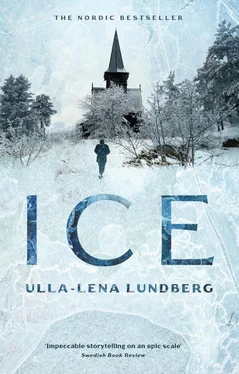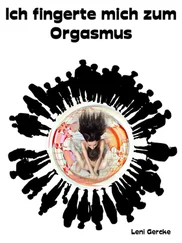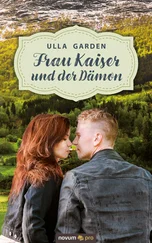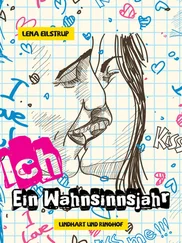Soon Mama and Sanna come back from the cow barn and Mama gives a shout. “Come and look!” she cries and grabs Lillus out of the box. The piglet collapses, trembling, when the dress is torn from his mouth, and Lillus screams in terror at being so abruptly awaked from her animal sleep. “Usch!” says Mama. “Pugh! You stink of pig! Look at this mess! She’s been lying right in the pig filth! You were supposed to be watching her!”
This last to Petter, who is ashamed of his disloyalty. It’s not as if he didn’t know what Mona thinks of Lillus’s piglet life. It’s hard, because he’s so impressed by the humanity he has seen awakening in Lillus, even if it’s directed towards a pig. He mumbles that he’d begun to read and was apparently blind to space and time. While he’s excusing himself, she gets the clothes off the screaming child and mixes bathwater in the big washbasin. The dress, which was washed and ironed, must now be washed and ironed, and the child, too, needs washing, not gently, while she screams and squirms.
Sanna looks at the pig with interest, and at Lillus, and when order has been restored, Swedenborg banished to a partition in the cow barn, and Lillus scrubbed and stuffed into her nightgown, Sanna suggests that Lillus behaves the way she does because she doesn’t know she’s a person.
Papa is awestruck. What a daughter he has! Yes, how could Lillus know that she’s a person? She’s at an age when she could just as well live with the cows in the barn or the sheep in the sheepfold. She would see it as perfectly natural, even though her prospects for the future wouldn’t be good. Compared with calves and lambs, she is little and defenceless. Sharp hooves would step on her and large bodies crush her to death. It’s not clear that she would understand how to suckle a cow, and nevertheless she would not know enough to wish for any other life.
Sanna obviously has a scientific bent, and she immediately tests her hypothesis. Lillus is sitting in her crib and is wide awake, as she usually is when it’s time to sleep. Sanna hangs over the edge and gets her sister’s undivided attention. “Lillus, are you a pig?”
Lillus is in a good humour and ready to go along with whatever Sanna suggests. “Oink, oink,” she yelps and laughs.
“Are you a cow?”
“Moo!” Lillus shouts and laughs at the top of her lungs. This reply can be considered a yes, and Sanna continues. “Are you a sheep?”
“Baa,” comes the answer, strong and persuasive.
“Are you a kitty?”
Papa notes with surprise that Lillus is thinking it over. She does not continue the game with the animal noises but is clearly considering her relationship with the cat and looks uncertain and unhappy. She looks at a big scratch she got on her underarm when she tried to eat from the cat’s bowl and the cat struck out with claws bared. Her mouth trembles at the memory, Mama chasing out the cat and scolding Lillus for not knowing better than to steal its food. No, Lillus is no cat, and Sanna continues.
“Are you a dog?” Sanna looks at her disapprovingly, angrily, and shakes her head, and Lillus shakes her head and looks appalled, for Sanna hates and fears dogs and does not want a sister who is a dog. “No! No!” Lillus assures her, and Sanna summarizes. “Lillus thinks she’s a pig and a cow and a sheep. But not a cat or a dog.” “Right,” says Papa, and Sanna goes on.
“Are you a person?”
This is hard. Sanna gives her no hint. How is Lillus to know if she’s a person? She looks at Papa for help, and he smiles and nods just slightly. Aha, but she hesitates when she looks at Sanna, the great authority, who says only, “Answer. Are you a person?”
Lillus vacillates. Papa seems to think that she is, but she has no strong feelings one way or the other, not like pig or cow or sheep. Uncertain, she looks at Sanna. “Yes?” she tries.
Sanna is pleased. “She doesn’t know. You heard it yourself!” she says to Papa.
“But she’s inclined to think she is,” he says. “Good, Lillus! Sanna is a person and Mama is a person and Papa is a person and you’re a person. We’re all people. The organist and the verger and the whole congregation!”
That’s a large group, and Lillus looks overwhelmed but rather pleased since both Sanna and Papa are included. Mama comes in and puts Lillus on the potty. Sanna reports that she has taught her she’s a person, not a pig.
“Good!” says Mama. “A big improvement. Now I want my two human children in their beds and I’ll read you a story.”
Papa stays and listens to Children of the Forest, although Mama signals that he can go. Sanna is completely absorbed. She knows the story by heart and moves her lips as it’s read. Lillus lies in her own world, a worm in the mould. What she reacts to is direct address, touch, smells, tastes in her mouth, things that move—a story read aloud still has no meaning for her. He has no memory of when they noticed that it was time to start reading to Sanna. How could he be so unobservant about his own child? Now he has a second chance with Lillus, and he means to be there when Lillus responds to her first story.
AS WINTER DRAWS CLOSER, his third on the Örlands, it seems to Petter that he has come far. He has just as much work as before but is calmer and more at ease with his duties. The sermons have begun to come easier, at last. The text and the length provide the framework, and as his own experience of life on the Örlands has grown, he is able to find more and more natural associations between the biblical texts and the life of his congregation. The points of contact are no longer limited to the Sea of Galilee and the desert as a metaphor for the sea, but now include all the human strengths and weaknesses that unite people in the distant past with today’s Örlanders. They resemble Zacchaeus and Caiaphas and Naomi and Ruth and the wise and the foolish virgins.
It is easier, now, to make it clear that Jesus is talking about them. The Örlands have become a biblical landscape that he makes use of in his sermons. When Jesus went up on Storböte and saw the glory of the archipelago, the devil appeared and said all these things will I give thee. He has to add that it would have been a great temptation for the priest himself. But we need not own what we love. If we’re at peace with God, if we’ve retained an unaffected soul, we can read God’s presence in all of creation. A presence is not something we can own, we can only gratefully receive the blessed moments when it is revealed to us. It is then we glimpse the face of God, like an intimation, in the constant subtle changes in nature’s countenance.
When he roams through the biblical stories, the scenes change and well-known figures vanish from sight and wander on unseen. The same thing happens on the Örlands, where so many people leave. People on the islands talk a great deal about the problems that arise from seeing more and more young people move to Sweden. They come back during their summer vacations, and those who suffer most from homesickness or who know that they’re needed for the fishing take the whole summer off and find new jobs in the autumn. There is a great deal of coming and going, and Post-Anton carries all of them, the cocky and the frightened, the heedless and those who already know that nothing is easy.
Others travel quietly and with self-restraint. The hardest to part with is Doctor Gyllen. Both Mona and Petter still have trouble expressing their friendship for her, stiff and guarded as she still is, but on a deeper level, they feel a love and a gratitude that fill their hearts. Once they’ve reconciled themselves to the fact that much of this must remain unspoken, it begins to be easier to behave naturally around her. Everyone knew that she would move as soon as she’d passed her licensing exam, but when it happens, they feel deprived, as if they will now find it difficult to live their lives.
Читать дальше












